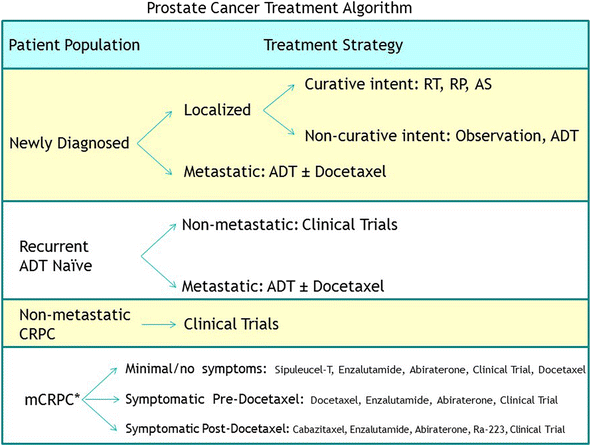The Society for Immunotherapy of Cancer consensus statement on immunotherapy for the treatment of prostate carcinoma
- PMID: 28031820
- PMCID: PMC5170901
- DOI: 10.1186/s40425-016-0198-x
The Society for Immunotherapy of Cancer consensus statement on immunotherapy for the treatment of prostate carcinoma
Abstract
Prostate cancer is the most commonly diagnosed malignancy and second leading cause of cancer death among men in the United States. In recent years, several new agents, including cancer immunotherapies, have been approved or are currently being investigated in late-stage clinical trials for the management of advanced prostate cancer. Therefore, the Society for Immunotherapy of Cancer (SITC) convened a multidisciplinary panel, including physicians, nurses, and patient advocates, to develop consensus recommendations for the clinical application of immunotherapy for prostate cancer patients. To do so, a systematic literature search was performed to identify high-impact papers from 2006 until 2014 and was further supplemented with literature provided by the panel. Results from the consensus panel voting and discussion as well as the literature review were used to rate supporting evidence and generate recommendations for the use of immunotherapy in prostate cancer patients. Sipuleucel-T, an autologous dendritic cell vaccine, is the first and currently only immunotherapeutic agent approved for the clinical management of metastatic castrate resistant prostate cancer (mCRPC). The consensus panel utilized this model to discuss immunotherapy in the treatment of prostate cancer, issues related to patient selection, monitoring of patients during and post treatment, and sequence/combination with other anti-cancer treatments. Potential immunotherapies emerging from late-stage clinical trials are also discussed. As immunotherapy evolves as a therapeutic option for the treatment of prostate cancer, these recommendations will be updated accordingly.
Keywords: Guidelines; Immunotherapy; Prostate Cancer; Treatment.
Figures
Similar articles
-
The Society for Immunotherapy of Cancer consensus statement on immunotherapy for the treatment of hematologic malignancies: multiple myeloma, lymphoma, and acute leukemia.J Immunother Cancer. 2016 Dec 20;4:90. doi: 10.1186/s40425-016-0188-z. eCollection 2016. J Immunother Cancer. 2016. PMID: 28018601 Free PMC article.
-
Practical guide to immunotherapy in castration resistant prostate cancer: the use of sipuleucel-T immunotherapy.Can J Urol. 2014 Apr;21(2 Supp 1):48-56. Can J Urol. 2014. PMID: 24775724 Review.
-
The Society for Immunotherapy of Cancer consensus statement on tumour immunotherapy for the treatment of cutaneous melanoma.Nat Rev Clin Oncol. 2013 Oct;10(10):588-98. doi: 10.1038/nrclinonc.2013.153. Epub 2013 Aug 27. Nat Rev Clin Oncol. 2013. PMID: 23982524
-
The Society for Immunotherapy of Cancer consensus statement on immunotherapy for the treatment of non-small cell lung cancer (NSCLC).J Immunother Cancer. 2018 Jul 17;6(1):75. doi: 10.1186/s40425-018-0382-2. J Immunother Cancer. 2018. PMID: 30012210 Free PMC article.
-
Society for Immunotherapy of Cancer consensus statement on immunotherapy for the treatment of bladder carcinoma.J Immunother Cancer. 2017 Aug 15;5(1):68. doi: 10.1186/s40425-017-0271-0. J Immunother Cancer. 2017. PMID: 28807024 Free PMC article.
Cited by
-
Impact of curative radiotherapy on the immune status of patients with localized prostate cancer.Oncoimmunology. 2018 Aug 27;7(11):e1496881. doi: 10.1080/2162402X.2018.1496881. eCollection 2018. Oncoimmunology. 2018. PMID: 30393582 Free PMC article.
-
Landscape of Immunotherapy in Genitourinary Malignancies.Adv Exp Med Biol. 2021;1342:143-192. doi: 10.1007/978-3-030-79308-1_5. Adv Exp Med Biol. 2021. PMID: 34972965 Free PMC article. Review.
-
Potentiating prostate cancer immunotherapy with oncolytic viruses.Nat Rev Urol. 2018 Apr;15(4):235-250. doi: 10.1038/nrurol.2018.10. Epub 2018 Feb 13. Nat Rev Urol. 2018. PMID: 29434366 Review.
-
Assessing Tumor-Infiltrating Lymphocytes in Solid Tumors: A Practical Review for Pathologists and Proposal for a Standardized Method from the International Immuno-Oncology Biomarkers Working Group: Part 2: TILs in Melanoma, Gastrointestinal Tract Carcinomas, Non-Small Cell Lung Carcinoma and Mesothelioma, Endometrial and Ovarian Carcinomas, Squamous Cell Carcinoma of the Head and Neck, Genitourinary Carcinomas, and Primary Brain Tumors.Adv Anat Pathol. 2017 Nov;24(6):311-335. doi: 10.1097/PAP.0000000000000161. Adv Anat Pathol. 2017. PMID: 28777143 Free PMC article. Review.
-
Management algorithms for metastatic prostate cancer.Can Urol Assoc J. 2020 Feb;14(2):50-60. doi: 10.5489/cuaj.5840. Can Urol Assoc J. 2020. PMID: 31039111 Free PMC article. Review.
References
-
- Fizazi K, Scher HI, Molina A, Logothetis CJ, Chi KN, Jones RJ, et al. Abiraterone acetate for treatment of metastatic castration-resistant prostate cancer: final overall survival analysis of the COU-AA-301 randomised, double-blind, placebo-controlled phase 3 study. Lancet Oncol. 2012;13(10):983–92. doi: 10.1016/S1470-2045(12)70379-0. - DOI - PubMed
LinkOut - more resources
Full Text Sources
Other Literature Sources
Medical
Research Materials

